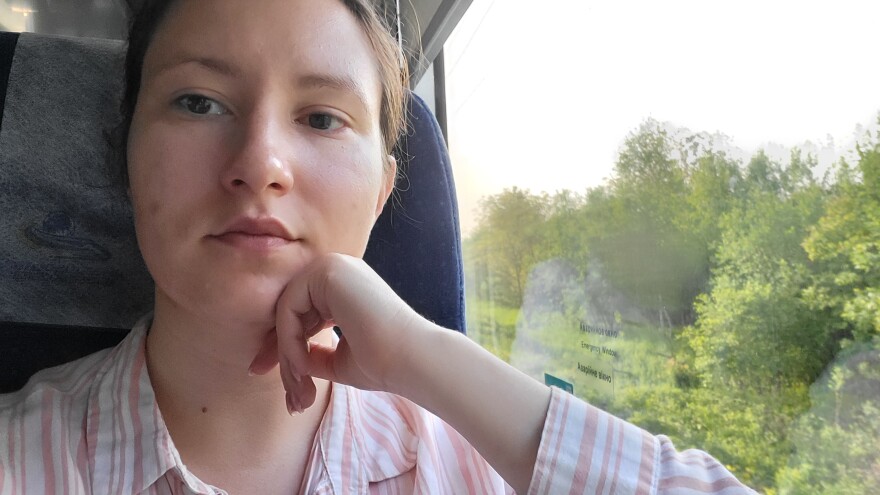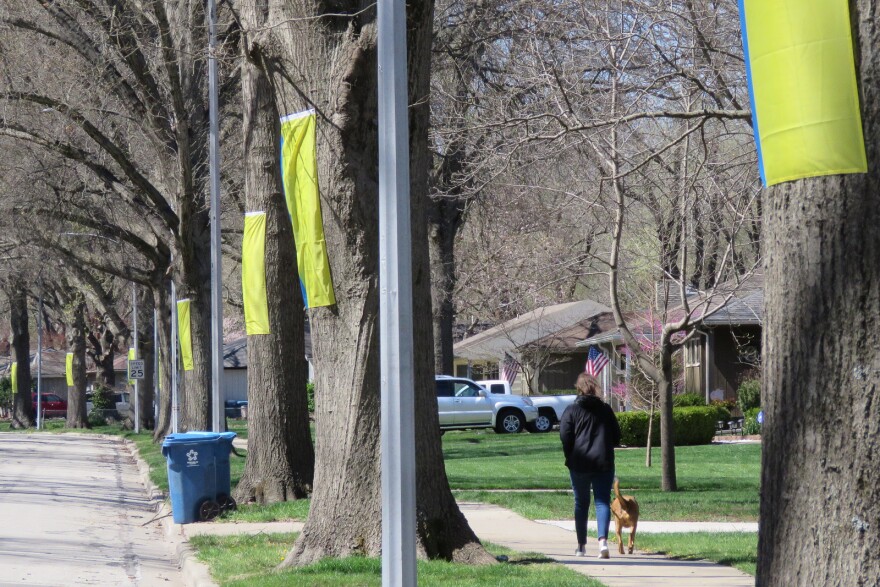Anna Yakutenko returned to her hometown of Kyiv for the first time this month.
Now 27, Yakutenko was a reporter for the Kyiv Post when she spent several months in Kansas City, training at KCUR in 2018 as part of the Alfred Friendly Fellowship, a University of Missouri program that brings international journalists to U.S. newsrooms.
“It’s good to be back. But it’s weird, to be sure,"' she said in an audio diary she’d been keeping at KCUR’s request. In February, not long after the Russian attacks began, she fled by train with her 69-year-old mother, Olena Malko, and their cat. They spent the next several months in the western Ukrainian town of Lviv.
It's weird, she explained, to see her life frozen at the moment she left, grabbing a small suitcase she had ready and a backpack with the equipment she'd need to work as a freelance journalist.
“I left behind so many things,“ she said, “material things. For example, I found my family photo album and I say now, ‘Wow, why didn’t you take that with you?’ Then I remember that wasn’t an option when we left. That made me very emotional.”

The war in Ukraine is no longer trending on social media or leading newscasts. Congressional hearings into the Jan. 6 insurrection and mass shootings have dominated recent headlines. Western consumers are griping about skyrocketing gas and food prices. Some are blaming Ukraine for refusing to make concessions to Russia even as international officials and aid groups are accusing Putin of war crimes.
“It’s very difficult to hear these comments,” Yakutenko said, “because it comes from Russian propaganda. There will be price spikes because Ukraine is a major supplier of wheat and many other things, including oysters Americans love to eat. But people need to ask, how much would you pay to preserve democracy?”

Tony Short of Prairie Village, Kansas, has a message for Yakutenko: Despite chatter about the economic impact of the war, Kansas Citians will continue to support Ukraine.
“I wonder if Anna knows how many unknown people in the Kansas City community are still involved in helping and supporting Ukraine?” Short wrote in an email to KCUR.
After Short heard one of KCUR’s earlier interviews with Yakutenko, he called to report that dozens of Ukrainian flags were hanging on the trunks of large shade trees and homes throughout the neighborhood between 75th and 79th streets from Nall to Lamar avenues in Prairie Village. Short purchased and distributed the flags himself when he learned Prairie Village was the sister city to Dolyna, in western Ukraine. He has also been working with a small Parkville, Missouri, company to send combat fatigues to Ukrainian recruits.
Connie Swartz of Celebrate Fatigues, started the company a few years ago to honor her husband’s service. Another motive was to keep his old uniforms out of the landfill. What began as a family operation sewing old uniforms into accessories has grown to include donations from around the country, a warehouse full of fatigues and professional seamstresses.
“My mission is to honor people who have worn these,” she said. “No reason not to extend that to people fighting in a foreign war.”

Kansas City's Ukrainian Club, meanwhile, has formed a nonprofit called Stand With Ukraine KC. The group has been raising funds for rapid response grants to several humanitarian groups in conflict zones. Members are working with the Kansas City Royals, the National World War I Museum and Memorial and the city of Prairie Village to sponsor awareness-raising events. Also, they're lobbying elected officials to help bring Ukrainian refugees to Kansas City.
"Naturally, we're disappointed that Ukraine is falling a bit from the headlines," said Andrew Meyer, 38, program director for Stand With Ukraine KC. "But we've also been impressed with the outpouring of support for Ukraine throughout K.C. We're seeing new Ukrainian flags popping up all the time throughout town."
Meyer is a former aid worker who spent four years working in the Donbas, in eastern Ukraine, one of the most heavily targeted areas of the Russian invasion. He met his wife, Karina, a native of the region, while they worked for the same NGO. Karina's mother just came to Kansas City through President Biden's Uniting for Ukraine parolee program while her father stayed back to fight.
Also working through volunteer organizations to send medical supplies, clothes, even tactical gear, is Ukrainian-born Lidyia Gettya, 39, a mother of two girls who works as a math teacher in Olathe. Through social media and internet chat rooms, Gettya learns what some of the immediate needs are on the ground in Ukraine and either mobilizes volunteers elsewhere in the U.S. or takes care of them herself.
“They only have winter uniforms but now it’s summer," she said. “A day ago I went to Costco and bought 40 packages of stay-dry, green T-shirts and insect repellent. All this seems trivial to us but to the guys in the field it’s a really big deal.”
Gettya has stepped up her efforts as she notices people losing interest in Ukraine.
“At first people were eager to support us,” she said. “Now it’s very upsetting that we have such a hard time raising awareness. Most people my age are more interested in Johnny Depp than women and children being raped in Ukraine.”

Not long after Anna Yakutenko’s return to Kyiv, Russians released a rocket attack, causing a series of explosions not far from her apartment. She chuckled at how accustomed to these disturbances she’d become.
“I woke up at 6 a.m., listened, then was like, ‘O.K., it’s not in front of my house,’ and I just turned and went back to sleep," she said.
Yakutenko finally convinced her mother to come home, with her cat. They both arrived back in Kyiv on June 18.
“Things now can really start beginning to feel normal," Yakutenko said. “Not normal-normal, but relative normal."
People are again out on the streets of Kyiv, she said, taking walks and sitting in cafes. She's even taking a trip to see friends in Poland.
But for Yakutenko, a young journalist who never expected to be covering an invasion of her home town — a war she describes as “ simply bonkers" — life today is an act of both patriotism and defiance.
“Ukraine, I hope, will never give up,” she said. “Sure, we’re worried the general public isn’t paying attention to this war but for us it’s a matter of people who have volunteered to go to the front lines when Russia invaded us. For us, it’s a matter of thousands of lives.”





